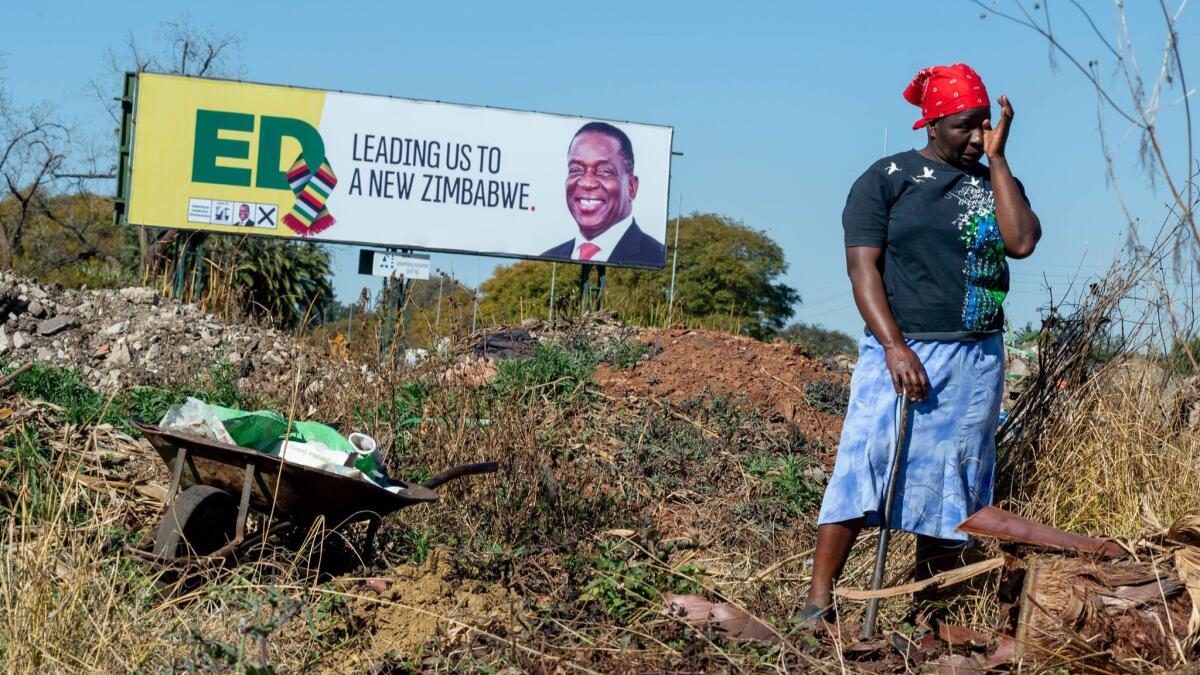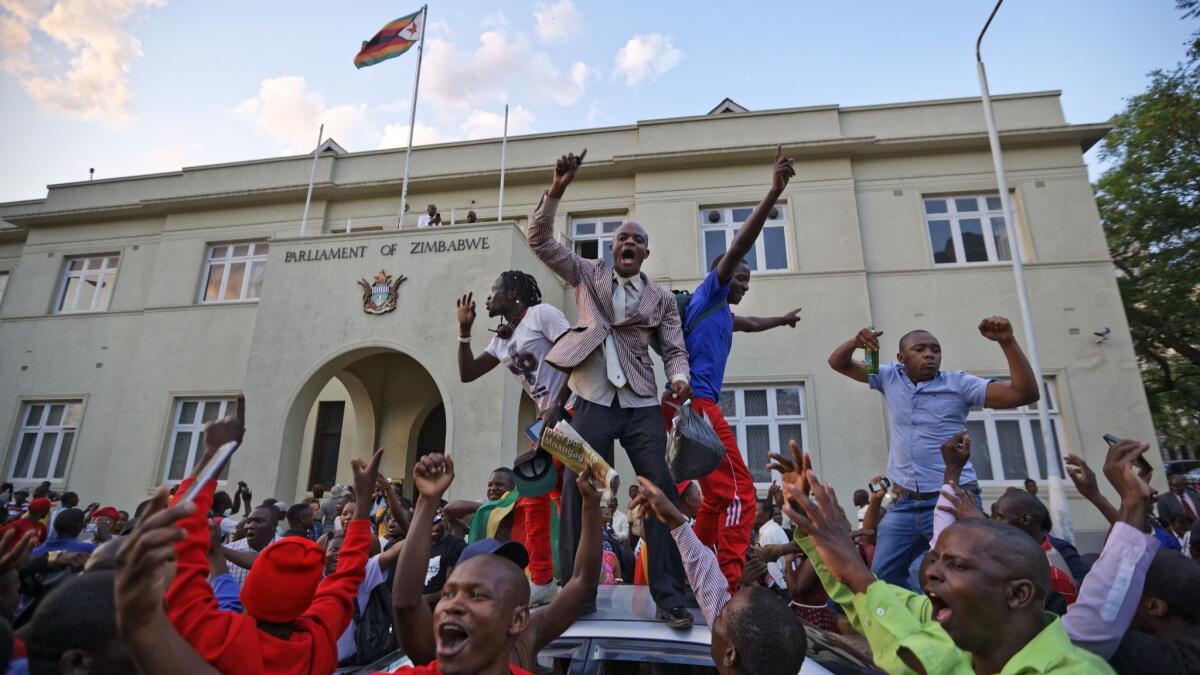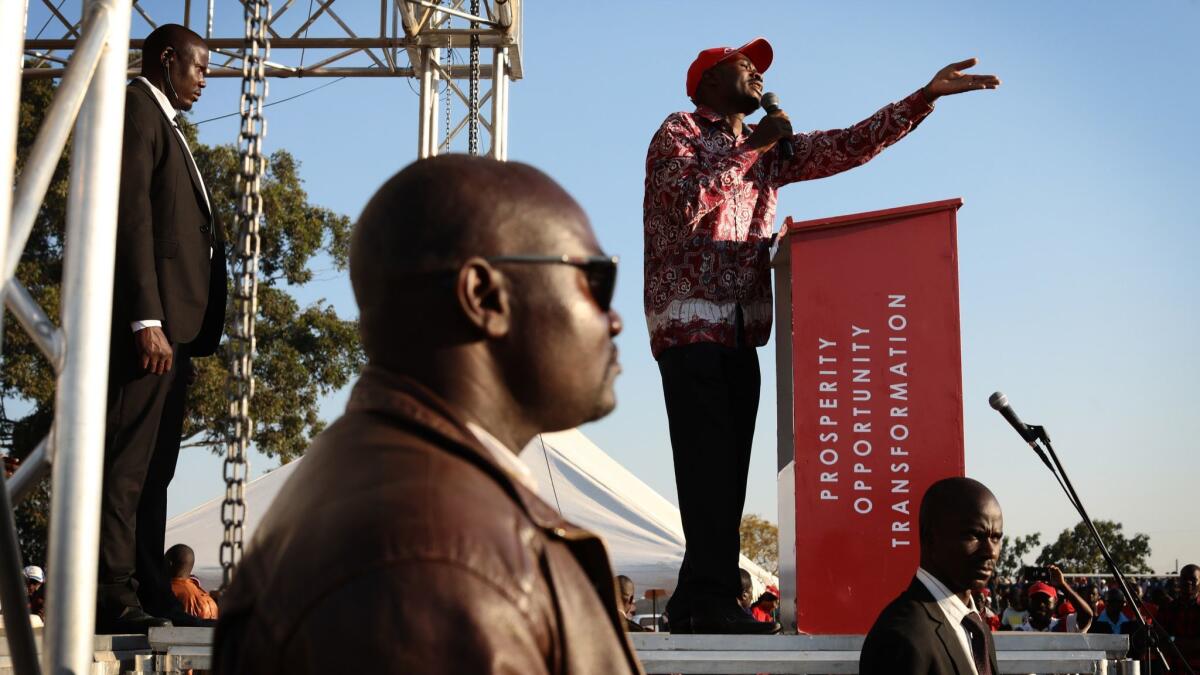Long memories pose big electoral challenge for the party that has ruled Zimbabwe since independence

- Share via
Reporting from INYATHI, Zimbabwe — One day in 1984, soldiers barged into Shadreck Ncube’s classroom in western Zimbabwe, dragged him outside in front of his students and accused him of plotting against the government.
Then they took him to a field and nearly beat him to death. Later, they came back and did it again.
His beatings were part of a wave of state-sponsored torture and killings in the 1980s across a large swath of Zimbabwe aimed at flushing out political opponents.
Code-named Gukurahundi, which in the Shona language means “the early rain that washes away the chaff,” the operation resulted in as many as 20,000 deaths, most of the victims from the Ndebele ethnic minority in the Matabeleland and Midlands regions.
The ruling party then, as now, was ZANU-PF — which took power at independence from Britain in 1980 and never let go, even last year when the army ousted Robert Mugabe after 37 years as president.
But in the run-up to presidential, parliamentary and local elections on Monday, the party appears vulnerable. And long memories are a big part of the reason.
Zimbabweans poured into the streets of the capital, Harare, in November to celebrate the ouster of Mugabe, whose reputation as hero of the liberation war was eventually subsumed by decades of disastrous economic policies, soaring unemployment and shrinking political freedoms.
ZANU-PF promised a fresh start. But the man the party appointed as Mugabe’s successor, Emmerson Mnangagwa, is a longtime Mugabe ally who was state security minister during the Gukurahundi violence.

Because of that history, many Zimbabweans believe he represents more of the same: a corrupt elite, economic collapse and political violence.
“Since Mugabe left, there’s been a little change, but we don’t see it,” Ncube said in an interview along the dusty main drag of Inyathi, the village where he lives. “The president needs to apologize.”
Ncube, now 75, said he plans to vote for a candidate from the opposition.
Mnangagwa, who earned the nickname “Crocodile” during the country’s liberation struggle, has denied any culpability in state-sponsored violence.
Like Mugabe, he has called Gukurahundi “a moment of madness.”
Vowing to lead the country in a new direction, he signed legislation in January creating the National Peace and Reconciliation Commission, an independent body aimed at helping the country reckon with its past.
“From the past, we must take the good that the past has in our history,” Mnangagwa said in an interview this year with the Financial Times. “And leave behind that which is bad. We don’t want that to be repeated, ever.”
He has also courted international investors seen as crucial to kick-starting the moribund economy, promised to rebuild the country’s beleaguered infrastructure and agricultural sectors and reached out to white farmers whose land was seized in the early 2000s.
“The current president is saying, ‘Look, I’m prepared to listen…. I’m prepared to accept the mistakes we have made,’” said Paul Mangwana, ZANU-PF’s acting national spokesman. “We must look forward to a new way of doing things.”
Next week’s elections are seen as a crucial test for Mnangagwa and his party and whether they are sincere about self-correction. Mugabe held elections, but they were lopsided contests that outside observers said were neither free nor fair. The 2008 elections were followed by severe violence that human rights groups say was perpetrated by the ruling party and the military.
Mnangagwa needs the upcoming polls to be deemed credible if he wants to pull in aid money and foreign investors. The weeks before the vote have been mostly peaceful, and scores of observers will be allowed to monitor the polls.
The president’s most serious challenger, Nelson Chamisa, a 40-year-old lawyer from the largest opposition party, the Movement for Democratic Change, has been campaigning openly across the country, unlike in previous elections. But he has already accused the government of trying to rig the balloting, and warned he will call his supporters to the streets if his concerns aren’t addressed.
“We have the numbers,” Chamisa said at a rally Saturday in Bulawayo, the largest city in Matabeleland, according to state media. “Right now, when I say shut down Bulawayo, the whole of Bulawayo will be shut down. When I say shut down Harare, Harare will indeed be shut down.”

A poll of registered voters conducted this week by Afrobarometer, a nonpartisan research group that conducts surveys across the continent, showed 40% supported Mnangagwa and 37% backed Chamisa.
The army has promised to remain neutral amid fears that its ousting of Mugabe set a dangerous precedent and that a win by the opposition could prompt another military intervention.
“If the opposition wins, then we are likely to have another coup on our hands,” said Dewa Mavhinga, southern Africa director for Human Rights Watch. “The military have been saying we would not risk our lives in November to hand over to an unknown person six months later.”
In Bulawayo, the smiling faces of Mnangagwa and Chamisa beam down from campaign posters plastered around the sleepy city, an old industrial hub where once-bustling factories have been shuttered for more than a decade. Some people say that since Mnangagwa took power, civil servants are more efficient and there are fewer police blocking the roads to demand bribes.
But there is little doubt that Chamisa is the favored candidate here, with vendors lined up to sell Chamisa-branded flags, scarves, hats and T-shirts in his party’s trademark bright red.
At a rally here in June, Mnangagwa had just finished speaking and left the stage when an explosion that officials have described as an assassination attempt injured dozens of people.
Though Matabeleland’s history has helped make the area an opposition stronghold, not everyone here feels wronged by the government.
Outside the small city of Gwanda, 60 miles south of Bulawayo, retired civil servant Wellington Nyoni trudged through a field of recently harvested maize and pointed toward his herd of cattle, their neck bells clanging as they walked.
A few months earlier, he received several cattle through a national agricultural program designed to benefit farmers. “This is what you call ‘bread and butter,’” said Nyoni, 60. “If I die today, my children will not say, ‘My father didn’t leave us anything.’”
Declining to say which party he planned to support in elections, Nyoni scoffed at the suggestion that the program was rolled out by ZANU-PF this year to woo rural voters like him.
“I’m not worth so little to be bought by cows,” he said. “I am a human being. I am a Zimbabwean.”
Mahr is a special correspondent.
More to Read
Sign up for Essential California
The most important California stories and recommendations in your inbox every morning.
You may occasionally receive promotional content from the Los Angeles Times.













